Department News
- Letter from the Chair
- MESDA Lecture
- OVST Madrid program
- Upcoming events
- Song Festival
- Spanish War film festival
- Golden Age Theater Symposium
- Cinema speaker
- 19th C film series
- VIDA
Letter from the Chair
Steven Wagschal
Dear Alumni and Friends,
Warm Greetings from the new Global and International Studies Building (GISB)! The building was just about completed when this letter went to press and by the time this reaches readers, we will no longer be found in Ballantine Hall, where the Department of Spanish and Portuguese has been located for the last 56 years, ever since the building’s completion in 1959. The Department is expected to be all moved in to our own space—the 2nd floor of the West Wing—by the time classes begin in August, 2015. It will be a hectic time, but the beautiful and innovative GISB holds great promise for the next phase of our Department’s development. Wherever we are located, I am certain that our undergraduate and graduate students will continue to thrive academically, winning awards and honors (for instance, in the last year, a whopping twenty-four majors were elected to Phi Beta Kappa) and being prepared for the careers of the future.
There have been splendid developments in the last year: Edgar Illas was granted tenure and promoted to the rank of Associate Professor, and Manuel Díaz-Campos was promoted to the rank of Full Professor. Congratulations to both for their accomplishments and contributions to the Department and beyond, including having recently published books about which you can learn more in the faculty publication section.
I am also happy to announce that Virginia Hojas and Sandra Ortiz were promoted to the rank of Senior Lecturer. Congratulations to both on this promotion based on excellence in teaching.
In 2015, we made two new tenure-track appointments. In January 2015, we were joined by Assistant Professor Patricia Amaral, an expert in Romance linguistics, syntax, semantics and language contact and change, who received her PhD from The Ohio State University and who came to us from a tenure-track position at University of North Carolina at Chapel Hill. And in August 2015, Olimpia Rosenthal joins the rank of Assistant Professor. Prof. Rosenthal completed her doctorate at the University of Arizona and specializes in Comparative Hispanic-American and Luso-Brazilian Colonial Cultural Studies, Postcolonial Theory and Andean literature and visual culture.
While we are thrilled to welcome new colleagues, I must also note that we lose to retirement, after 30 years, long-time faculty member Professor Catherine Larson who joined the emeritus rank in July 2015. On behalf of the Department, I would like to thank her for her superb and innumerable contributions to the excellence of our Department, the University and the profession. You can read more about Professor Larson’s career in a separate article in this newsletter.
The newsletter highlights the varied academic, cultural and interdisciplinary experiences that our students and faculty have engaged in during the last academic year. In particular I'd like to mention that our Department continues to promote cinematic culture, this year with multiple film series, including “Porous Borders” about the documentary films of Natalia Almada, in which the Macarthur-Award-winning director participated in a live interview at IU Cinema (organized by Andrés Guzmán and Jonathan Risner); one on Spanish Civil War (organized by Jonathan Risner and doctoral candidate Antonio Parrilla-Recuero); and another on cinematic adaptations of fiction by the great nineteenth-century Lusophone authors Machado de Assis and Eça de Queiros (organized by Estela Vieira and Luciana Namorato). Faculty members are also promoting linguistics research and literary culture, both high and popular. For instance, Laura Gurzynski-Weiss organized a visit by distinguished second language acquisition researcher, Shawn Loewen. Undergraduates also participated in the annual Spanish and Portuguese Song Festival organized by Israel Herrera, while Reyes Vila-Belda organized a special Poetry Recital for her students of S417 Hispanic Poetry, which was dedicated to the works of a variety of female poets including Rosario Castellanos, Alfonsina Storni, Gioconda Belli, Gloria Fuertes and Julia de Burgos.
The "Events" section of the department's webpage will be the place to look if you live in the region or will be travelling here and are interested in attending one of the activities planned for 2015-16, such as the symposium on “Interlocutor Individual Differences in Cognition and Second Language Acquisition” (organized by Laura Gurzynski-Weiss) and the symposium "Transatlantic Dialogues: Realism and Modernity in Nineteenth-Century Portugal and Brazil" (organized by Estela Vieira and Luciana Namorato).
Many of our myriad activities are funded in part with the support of our friends and alumni. Thus we are incredibly grateful to all of our alumni and friends who have made a commitment to the excellence of our departmental missions by contributing intellectually, personally, and financially. If you will be coming to town, be sure to let us know so that we can welcome you personally.
On a final note, in 2015-16, Professor Kimberly Geeslin will serve as Interim Chair as I will be on sabbatical in Spain. I will return to the Chair’s office in the new GIS building in July 2016.
Hasta luego, Até logo, Fins aviat,

Steve Wagschal
Chair, Department of Spanish and Portuguese
Spanish & Portuguese Welcomes Alum Weissberger for MESDA Lecture
Barbara F. Weissberger
Since 1996, the Department of Spanish and Portuguese has paid tribute to a long-serving and distinguished emeritus professor through an alumni lecture in his honor. Professor Merle E. Simmons was a professor and scholar of Spanish American Colonial literature at IU from 1942 to 1983. Professor Simmons’s contributions to the department and to scholarship included authoring seven books, developing the program of study in Spanish American Colonial literature at Indiana University, and serving as director of graduate studies for seven years and department chair for five.
Each fall, the Department of Spanish and Portuguese honors Professor Simmons by inviting a distinguished alum of the department to visit Bloomington, speak to the department’s faculty and students, and reconnect with his or her roots as a part of the Merle E. Simmons Distinguished Alumni (MESDA) Lecture. This year’s lecture, entitled "The Queen's Dreams: Lope de Vega's Representation of Queen Isabel I", was presented by Barbara F. Weissberger.
Prof. Weissberger is an Emerita faculty member in the Department of Spanish and Portuguese at the University of Minnesota—Twin Cities. She graduated with a BA in Spanish Literature from Indiana University and received her PhD in Romance Languages and Literatures from Harvard University. Professor Weissberger has written dozens of articles and book chapters on gender, ethnicity, sexuality, and sovereignty in Medieval and Renaissance Spanish literature, and is considered a leading feminist scholar in the field of Hispanomedievalism. Her essay, “Gender and Genre: The Gendered Taxonomy of Spanish Romance,” received the John K. Walsh Prize, awarded for most outstanding essay by the MLA Division of Medieval Hispanic Languages, Literatures, and Cultures in 2001. In 2006, she received the International La Corónica Book Award for Isabel Rules: Constructing Queenship, Wielding Power (U of Minnesota Press, 2004). In this groundbreaking monograph, she examined the role of competing gendered representations of the Catholic Queen in the construction of her public image. Together with María Judith Feliciano, Leyla Rouhi and Cynthia Robinson, she co-edited a 2006 special issue of the journal Medieval Encounters: Jewish, Christian, and Muslim Culture in Confluence and Dialogue, entitled Interrogating Iberian Frontiers. In 2008, Prof. Weissberger edited an important multidisciplinary volume, Queen Isabel I of Castile: Power, Patronage, Persona (Boydell and Brewer), inspired by the quincentenary of Isabel’s death. She is currently working on another book-project, entitled Anti-Semitism and Nationhood in Spain: 1490-1945.
This coming fall, the MESDA lecture will be given by Dr. Malcolm Compitello (PhD, Indiana University). He is Professor and Head of the Department of Spanish and Portuguese at the University of Arizona. Professor Compitello has written extensively on Spanish Civil War fiction and is a leading scholar in Spanish urban cultural studies. He is the author of Ordering the Evidence: Volverás a Región and Civil War Fiction (1983), as well as several edited volumes. Professor Compitello is the Executive Editor of the Arizona Journal of Hispanic Cultural Studies and serves on the editorial boards of the Journal of Urban Cultural Studies, Revista de ALCES XXI: Journal of Contemporary Spanish Literature & Film, MVM: Cuadernos de Estudios de Manuel Vázquez Montalbán, and the Palgrave MacMillan Series on Hispanic Urban Cultural Studies. In 2012, Professor Compitello was the subject of a special edited volume, Capital Inscriptions: Essays on Hispanic Literature, Film and Urban Studies in Honor of Malcolm Alan Compitello (Ed. B. Fraser), in recognition of his contributions to Hispanic studies.
We hope you will plan to join us on September 25, 2015 for this exciting lecture and the reception that follows!
Madrid-IU Program Offers Fall Semester Opportunity for First Time in 50-Year History
Dr. Reyes Vila-Belda, Associate Professor of Spanish at IUB, was the resident director of the 2013-14 IU-Wisconsin-Purdue program in Madrid. She remarked recently that it was a privilege to see students mature before her very eyes during their time abroad. They conquered not only the language and the culture but became much more self-confident in every way imaginable as they tackled many urban challenges on their own in Madrid and its environs.
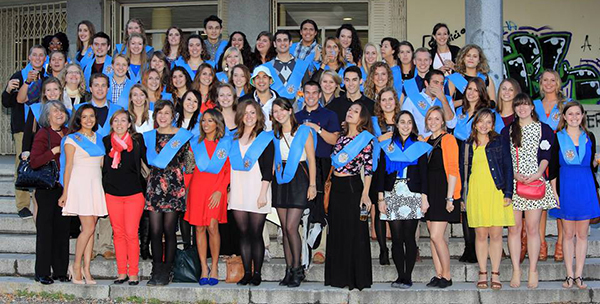
Professor Vila-Belda with 2013-14 Madrid group on their program ‘graduation’ day
IU began sending students to Madrid in 1967 as part of a joint academic year program with Purdue University, later expanding the consortium to include the University of Wisconsin as well. In 1998 the program opened a spring-only option for students whose majors could not accommodate a full year abroad, an option which has proven very popular. As a result, University Complutense of Madrid is now making it possible for the program to offer a fall-only option as well, providing additional oppportunity for more students to take advantage of the strengths of this program. Students have been drawn to the Madrid program for its immersive and independent structure, including the chance to live with local students in apartments while taking all their courses in Spanish. Spain continues to be one of the top two destinations chosen by IU students for study abroad.
Current program participants in Madrid are from a wide variety of backgrounds and often pursue a variety of second majors in addition to Spanish, including: Linguistics, International Studies, Psychology, English, Computer Science, History, and Telecommunications. On-site many students participate in volunteer positions or teach English. Several students have returned to Spain after graduation to pursue positions as Language and Culture Assistants through the Spanish Ministry of Education, Culture, and Sports.
One recent participant is Christine White, who studied abroad in two subsequent semesters in Lima, Peru and Madrid. At IU, Christine pursued three majors in Spanish, economics, and political science in additional to a minor in Near Eastern languages and cultures. While she was still abroad in Madrid, Christine was notified of her selection for the prestigious Harry S. Truman Scholarship with a Skype call from President McRobbie. In 2014 only 59 students received this award, which provides generous funding and priority admission at top-tier graduate schools.
“Upon returning to IU, Christine was selected to work for the Office of Overseas Study as a Peer Counselor. In this role, Christine was able to help us advise future program participants and complete a number of special projects, given her unique experiences. Madrid-IU students are often some of the more passionate students I have the opportunity to work with in my role as a Study Abroad Advisor,” notes Danielle Samek, who has advised students in Spanish-speaking countries since 2011. Christine will be returning to Peru to work with the Light and Leadership Initiative in Huaycán, a non-profit organization she volunteered with while studying abroad.
Another Madrid-IU alum, Sarah TeKolste, was recently profiled in a video as part of a 2015 IU Seniors series created by the Office of the Provost & Executive President. While abroad, Sarah rediscovered her love of performing and how theater can be utilized as a language learning tool. Sarah majored in Spanish and theatre & drama with an undergraduate certificate in Latin American & Caribbean studies. She was also active in numerous organizations and activities during her IU career including the Board of Aeons, University Players, Global Brigades, and Grupo de Teatro VIDA. She will be going on to teach high school Spanish, undoubtedly drawing from her personal experiences at IU and abroad.
When spring 2014 program participant Lakenvia Ledford was asked what she thought of her experience abroad, she stated that “Going abroad is one of the best things that a person can do if they desire to truly learn and be prepared for any professional setting.” As both a Spanish major and pre-medicine student, Lakenvia chose Madrid for its affordability and immersion components as she plans to use the language regularly in her career.
The new fall option in Madrid will open up these types of experiences for more IU students in the coming year, as long as they take advantage of the chance to do so. There are numerous scholarship and grants available to them to make this a reality. For more information about applying to the program, as well as costs and scholarship opportunities, click here.
Upcoming Events
20th Annual Merle E. Simmons Distinguished Alumni Lecture and Annual Department Reception, Friday, Sept. 25, 4:30 p.m. in the IMU Georgian Room. Dr. Malcolm Compitello will deliver the lecture “The Place of Tiempr de silencio.” http://www.indiana.edu/~spanport/events/MESDA_2015_poster.pdf
Symposium on Interlocutor Individual Differences, October 1-2, IMU Tree Suites. http://www.individualdifferencesinsla.com/
Transatlantic Dialogues: Realism and Modernity in Eça de Queirós and Machado de Assis, October 23-24 http://www.xix.indiana.edu
Teatro VIDA production, November 5-7, Bloomington Playrights Project. http://www.indiana.edu/~vida/
Spanish and Portuguese Song Festival Celebrates 5th Anniversary
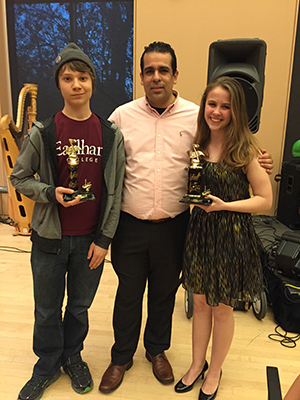
High School winner Joey Kersey, Israel Fernando Herrera
and IU Undergrad winner Theresa Spech
The fifth annual Spanish and Portuguese Song Festival took place April 10th at the Neal Marshall Black Culture Center. Eight students participated, including those from our own Spanish and Portuguese department, as well as from the Academy of Science and Entrepreneurship High School. Special guest performances included Birimbi, an Afro-Colombian and Carribbean band, Brazilian bossa nova and jazz singer Valeria De Castro and Mexican harpist Emmanuel Padilla. For the first time, this year’s festival included a Special Audience Award.
The jury in charge of selecting the best performances included music experts from the Latin American Music Center, the Jacobs School of Music, and Department Faculty Vania Castro, Viviannette Gonzalez, Robin Reeves and Mazinha Hauskrecht. Student Jamie Dirk took third place singing Jesse and Joy’s song “Corre, corre.” Travis Puntarelli was awarded second place with his performance of Gilberto Gil’s “Super Homem". Spanish and Portuguese major Theresa Spech took first place singing “Não fui eu”, by Paula Fernandes. High school student Joey Kersey was the winner in the high school category with his performance of Carlos Santana’s “Corazón Espinado.” The 6th Annual Spanish and Portuguese Song Festival will take place in the spring of 2016. More details will be announced on the department webpage.
“The Spanish Civil War through Film” Series Draws Crowd
The Spanish Civil War remains a salient theme in contemporary Spanish cinema and, in some sense, constitutes a national genre unto itself allowing one to refer to a movie as a “Spanish Civil War film.” With support from the Department of Spanish and Portuguese and the Arts and Culture division of the Spanish Embassy, Assistant Professor Jonathan Risner and current graduate student Antonio Parrilla Recuero organized a film series entitled “The Spanish Civil War through Film” this past spring. The series consisted of four feature-length movies that highlighted the conflict’s various facets and distinct perspectives through which it can be understood, such as the comedic and tragic experiences of a vaudeville troupe entertaining soldiers in the midst of war, the harrowing experiences of women, and the participation of a British soldier and his resulting disillusionment. The four films screened were ¡Ay, Carmela! (1990), Land and Freedom (1995), Las trece rosas (2007), and La voz dormida (2011). Álvaro López Pajares, James Lang, Nora Gardner, Jackie Markle, also graduate students in the Department, provided outstanding introductions to the films. Each of the screenings were well-attended and drew students, faculty, and community members.
Golden Age Theater Symposium Honors Retiring Professor Catherine Larson
Mindy Badia, Catherine Larson, Anthony Grubbs, Robert Bayliss
On Friday, April 17th, 2015, the Department of Spanish and Portuguese and the Medieval and Early Modern Hispanic Studies Research Group (MEM) hosted a small symposium on Golden Age Theater in honor of Professor Catherine Larson’s career, on the eve of her retirement which took effect at the end of the 2014-15 academic year.
The event featured talks by three of Professor Larson’s former doctoral students. The three speakers were Dr. Mindy Badia (PhD 1996) Associate Professor at IU-Southeast,
Dr. Robert Bayliss (PhD 2003), Associate Professor at the University of Kansas, and Dr. Anthony Grubbs (PhD 2005), Associate Professor at Michigan State University.
Dr. Badia’s paper, “Too Near the Bone: Translation, Los melindres de Belisa, and the Problem of Proximity,” employed translation theory to investigate theoretical and practical issues involved in performing translations of comedias by Lope de Vega and other early modern playwrights. In his paper, “What’s in a Name? Branding Lope de Vega,” Dr. Bayliss treated viewers to an analysis of his survey of popular and high cultural references to Spain’s most famous playwright. Finally, Dr. Grubbs closely examined representations of the hagiographic story of Saint Christopher in his paper “From Page to Stage: New Observations on the Post-Tridentine Flores Sanctorum and their Impact on two Comedias de Santos.”
The three talks were followed by a lively question and answer period and a crowded reception at which the exemplary career of Prof. Larson was celebrated.
Documentary Filmmaker Almada Visits IU
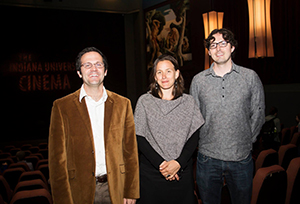
Jonathan Risner, Natalia Almada, Andrés Guzmán
This past October 27th and 28th, 2014, IU was honored to host documentary filmmaker Natalia Almada. Two of her films were screened at the IU Cinema in a series devoted to her work entitled “Porous Borders.” Almada has made four films to date, and her movies bring original outlooks to topics as wide-ranging as immigration, declining regional economies, popular culture, the drug war, and Mexican political history. She has received fellowships from the MacArthur Foundation and the Guggenheim Foundation, and her films have been screened at the prestigious venues such as the Sundance Film Festival and Cannes.
During her visit, Ms. Almada interacted with students, faculty, and the Bloomington community in numerous ways. She gave a Master Class at the IU Cinema to undergraduate and graduate students, and had an engaging discussion about her films with graduate students from two courses in the Department of Spanish and Portuguese. Ms. Almada also participated in an interview with Araceli Gómez-Aldana, a producer/co-host of HOLA Bloomington, a Spanish-language radio program on WFHB (91.3). Ms. Almada gave a well-attended Jorgensen lecture at the IU Cinema, where her films Al otro lado (To the Other Side) and El Velador (The Nightwatchman) were also screened. Each screening was followed by an animated Q & A session.
Assistant professors Andrés Guzmán and Jonathan Risner organized the visit and received generous support from CAHI, the Department of Spanish and Portuguese, Latino Studies, CLACS, the Department of Communication and Culture, Film and Media Studies, the Department of American Studies, and the Office of the Vice President for Diversity, Equity, and Multicultural Affairs.
Portuguese Program Organizes Film Series and International Symposium
The Portuguese Program is organizing an international symposium to be held at Indiana University on October 23rd-24th, 2015, titled, “Transatlantic Dialogues: Realism and Modernity in Eça de Queirós and Machado de Assis.” This event will bring together some of the most innovative scholars and recognized experts currently working on Portuguese and Brazilian nineteenth-century literature and culture. In preparation for the fall symposium, the Portuguese Program organized last spring semester a film series titled, “19th-Century Portugal and Brazil Film Series.” These films brought the work of the two greatest writers of this period: Machado de Assis from Brazil and Eça de Queirós from Portugal to the attention of students, faculty, and the wider community. We showed five different films based on the novels and short stories by Eça and Machado. Students in the upper-level Portuguese classes also read the works that the films were based on. The series was very well attended. Many of the students are excited and now much better prepared to attend and participate in symposium in the fall. The five films were: Mystery of Sintra (2007), Posthumous Memories (2001), Eccentricities of a Blonde-Haired Girl (2009), Midnight Mass (1982), The Crime of Father Amaro (2002). All films were free and open to the public, had English subtitles, and were presented by a faculty member or graduate student.
Encerrados: Power, Politics, Proverbs
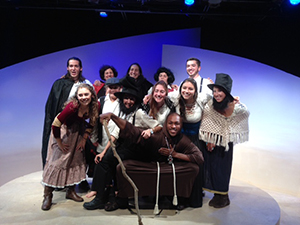
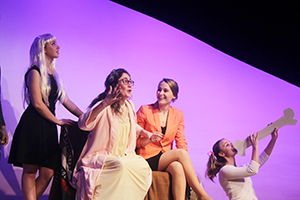
VIDA performers
On October 23rd-25th VIDA performed its ninth annual production, Encerrados, at the Bloomington Playwrights Project and November 14th and 15th at the IndyFringe Theater in Indianapolis. The suite consisted of four short plays from Latin America and Spain, and for the first time, Portugal. Each play explored the theme of enclosed spaces –physical, emotional, social and political. Olimpia Rosenthal and Cristóbal García Garza directed Un hogar sólido (1959, México), which questions the role of women in Mexico through the animation of a family of cadavers from the confines of a mausoleum. EEnrique Buenaventura’s El presidente (2009, Colombia) directed by Gloria Navajas and Paula Sánchez, forms a critique of Colombian political power structures from within a jail cell and through the quixotic antics of its prisoner, the President. Alysa Schroff and Hannah Agauas directed the first act of Myrna Casas´ absurdist piece, La trampa (1963, Puerto Rico) where subversive family members are locked away in back rooms, attics and even a giant aluminum can. Finally, Farsa de Inês Periera (1523, Portugal) by Gil Vicente marked VIDA´s first Portuguese language play directed by Estela Vieira, Vânia Castro and Valéria DeCastro. This play, based on a Portuguese proverb, features a young woman who at times is locked within her room by a jealous husband and who is always fighting against the constraints of the expectations of others.
This year’s performance would not have been possible without the passion and dedication of its many faculty, graduate, undergraduate and community volunteers.